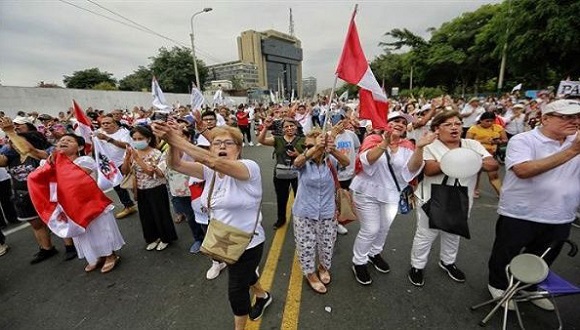A man holds a banner reading "New Constitution" as police officers stand guard during an anti-government protest, in Lima, Peru, on February 4, 2023. Photo: Reuters.
Disapproval of the Peruvian Congress reached 90% in February, the highest level since the mandate began, while citizen rejection of President Dina Boluarte rose from 76% to 77%, according to a survey by the Institute of Peruvian Studies (IEP). ) disclosed this Sunday by the newspaper La República.
The poll, carried out between February 18 and 22, reveals that only 6% of the population supports the work of the deputies, who rejected four motions this month that proposed an electoral advance, one of the main claims of the anti-government protests. that exploded in December and add up to a balance of 70 deaths.
The rejection of Parliament climbs to 95% in the south of the country
, stronghold of social mobilizations that also call for the resignation of Boluarte and the call for a constituent assembly.
The president, for her part, has 77% disapproval, a figure that rises to 86% also in the southern part of the national territory.
The IEP survey also shows that
69% of Peruvians believe that it is convenient for the country to hold general elections this year
, while 19% defend that there be elections in 2024 and only 8% consider that the Executive and the Legislative should finish their terms in 2026.
At the beginning of February, Congress failed in four attempts to advance the general elections, which, except by surprise, buries the possibility of elections this year.
Likewise, always according to the survey, 73% of the citizens demand the resignation of Boluarte and 25% believe that he should remain in the Presidency.
The President of Peru, Dina Boluarte, and her Prime Minister, Alberto Otárola, on the day of her appointment.
Photo: Presidency of Peru.
The massive disapproval of Boluarte intensified this Monday the demand for the resignation of the president
, who took office less than three months ago and has reiterated on several occasions that her resignation "is not at stake", since she considers that it would not be the solution to the social and political crisis that the Andean country is going through.
Since the protests broke out last December, 70 people have lost their lives in direct clashes with law enforcement and roadblocks by protesters, according to various sources.
Former Prime Minister Mirtha Vásquez pointed out that the survey figures determine that Boluarte must resign, because under his administration
Peru is "a country with democracy in rubble."
He added that the main powers of the State were visibly captured and the population is polarized and with serious unattended problems.
"The 6% govern," said the general secretary of the Communist Party-Patria Roja, Arturo Ayala, about the meager support given in the poll to the Parliament that supports the president.
The leader added that
the Legislature constitutes "an absolute minority intoxicated with power."
The progressive parliamentarian Ruth Luque focused her opinion on the precariousness of the approval of Congress and added that its members, with so little citizen endorsement, block the electoral advance demanded by the majority of citizens, shield a repressive government and threaten those who protest.
"This Congress no longer represents anyone and the population says so
," added Luque.
The spokesman for the centrist group Coalición Ciudadana, Álvaro Henzler, commented that the Government and Congress "appear to be institutionally strong, when, in reality, they report the highest levels of citizen rejection."
“We are in an increasingly unsustainable democracy.
We are already in a kind of institutional rubble
”, she expressed.
To the government's problems, he added the disproportionate use of force against the protests - calling for Boluarte's resignation - and "the approval of counter-reforms, as in the case of university education, and we hardly see any way out," he said.
The growing demonstrations in the capital continue after seven weeks of national protests.
Photo: Marco Garro/NYT.
(With information from EFE and Prensa Latina)
